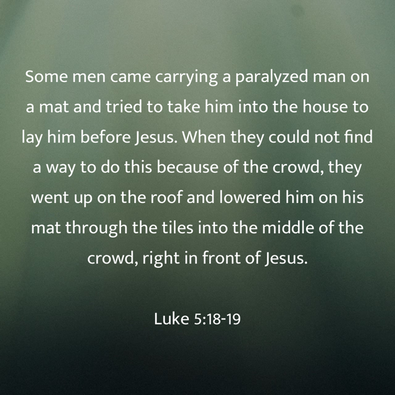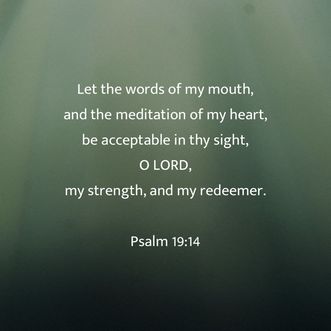|
Good Morning!
Happy Palm Sunday! We're so glad you're joining us today!
When we meet in person, we share our joys and concerns together. Take some time to think about the past week, and any prayer requests you may have. If you would like, you can share them in the comments. When you are ready, use the prayer below, based on a prayer from crosswalk.com, to get started.
Father,
Palm Sunday is here, and the past two years has brought tumultuous times and flashes of fear that none of us have experienced in our lifetimes. The very real fallen state of our world and frailty of life have been put front and center in our lives in a visceral way. We look to you, Father, to guide us out of our fear and remind us of our Savior. We do not need to be afraid. You have given us the wisdom we need to live each day of our lives to the full purpose You have designed for us to live. Amen.
Today's lesson is on Matthew 26:17-30.
Our lesson today is a very familiar story. This is the last supper, and the first communion. We have read the account from Matthew, but there are also versions of the same story in Mark, Luke, and John. Our book also mentions a discussion of the communion meal in 1 Corinthians.
Lesson Context
The book of Exodus in the Old Testament tells the story of the Jewish people's enslavement in Egypt, subsequent escape, and travel in the desert. Moses attempted to get Pharaoh to let the Israelites leave. As Pharaoh refused, various plagues were inflicted upon Egypt. At the end, the Jewish people were instructed to slaughter a lamb. They were to put the blood from the lamb around the door frames. They were to roast and eat the lamb, along with unleavened bread and bitter herbs. On that night, the spirit of the Lord went through Egypt, killing all the firstborn. However, the Lord would pass over the houses marked with blood (see Exodus 12). The Israelites were commanded to observe the Passover Feast as a way to remember their dramatic deliverance from bondage in Egypt. According to our book, the Passover Feast occurred on one night, and the Festival of Unleavened Bread lasted for the full week immediately following. This holiday occurs on the fourteenth day of the first month of the Jewish calendar, which is somewhere between late March and early April. During Jesus' time, pilgrims would go to Jerusalem to butcher their lambs at the temple. Then, they would celebrate the feast with their families or other companions. The lamb is not really mentioned in the accounts in the New Testament, with the bread and wine playing much larger roles. Our book notes that, "the symbolism of the animal's absence from the story should not be lost on us. As our lesson begins, the sacrifice was already present."
I. Readying the Passover (verses 17-19)
Our book estimates that in Jesus' time, at least 85,000 extra people went to Jerusalem for Passover. It would have been incredibly overcrowded. Jesus and his disciples were in the village of Bethany, near Jerusalem. It seems that Jesus had made arrangements with a certain man before the festival was upon them, so that they had somewhere to stay. The long journey to Jerusalem meant that many pilgrims purchased their sacrificial animals there, instead of bringing the animals with them. Jesus' disciples would have needed to purchase an animal for their Passover meal as well.
II. The Passover Plot (verses 20-25)
The Passover meal is eaten in the evening. In Jesus' time, seating for special meals involved reclining on low couches. A modern explanation of the celebration of the Passover Seder says that this is still done, as a sign a freedom. At the time of this meal, Judas had already agreed to betray Jesus. Jesus announces at the meal that one of the people there would betray him. Prophets usually said something along the lines of, "this is what the Lord says," while apostles made statements like, "it is written." Jesus uses his own authority, asserting his place as God's Messiah. The disciples present seem blindsided. "Surely you don't mean me, Lord?" Jesus' initial response is not helpful. The method of eating at the time was for everyone to eat from communal dishes, so all of them have shared food with Jesus. Anyone there could be the one to betray him. Judas asks almost the same thing as the other men present. Except, he calls Jesus Rabbi, not Lord. This means that Jesus was an exceptional teacher of the law. However, it misses the heart of Jesus' identity.
III. Passover and the Kingdom (verses 26-30)
The Passover meal is full of symbolic significance. The modern Passover meal has 15 steps. It includes a specific order of eating foods, drinking wine, and telling the story of leaving Egypt. As part of the celebration, four different cups of wine are drunk. Our book says each cup is associated with promises God made in Exodus 6:6-7: "I will bring you out ... I will free you ... I will redeem you ... I will take you." The cup Jesus used for his blessing was probably the third cup, for redemption. The blood of the Passover lamb protected the Israelites in Egypt. However, drinking blood was explicitly forbidden. The idea of ingesting the blood of the covenant may speak to an inner change, not only an outer show. Jesus says that he will not drink from the fruit of the vine, the wine, until he is with the disciples in his Father's kingdom. Our book notes that the fourth cup of wine at Passover traditionally looks forward to the coming kingdom. It is unclear whether Jesus meant he would not take the fourth cup, or that this would be his last time having the Passover.
Conclusion
Jesus knew that his whole life pointed to a final Passover. His life was given in sacrifice for the sins of humanity, washing us clean in his blood so that our sins are forgiven, never to be brought against us. One last Passover with his closest friends would mark the beginning of a new Lord's Supper. Themes of remembrances and thanksgiving have united Christians worldwide for nearly 2,000 years in a practice that honors our crucified Lord. All Christians are given the opportunity to remember God's miraculous salvation -- with a new ceremonial meal shared by a new family. We participate together, knowing that we are part of a body in a new covenant with God. What the prophets dreamed of is the life that we today have been given in Christ. At the same time, we long for the ultimate coming of the Father's kingdom when we will sit at the table with Jesus himself. Every bite of bread, or sip of the fruit of the vine connects us to the past, present, and future of God's story. Prayer Father, thank you for sending Jesus as our perfect sacrificial Lamb and for inviting us to your table. Let the anticipation of sharing the feast with Jesus guide us daily. In Jesus' name we pray. Amen.
Questions for Discussion
Benediction
This week's benediction is from the American Standard Version.
Next week's lesson will be on Matthew 28:1-10.
0 Comments
Leave a Reply. |
AuthorWe are a small, rural Presbyterian church in southwestern Pennsylvania. Archives
July 2024
Categories
All
|



 RSS Feed
RSS Feed